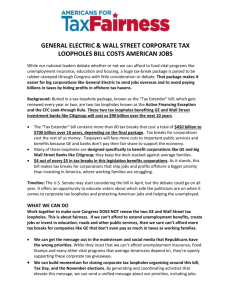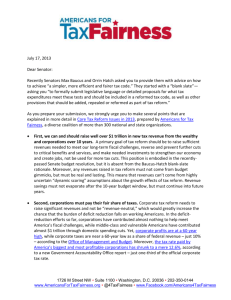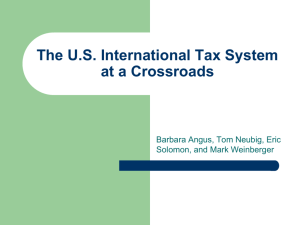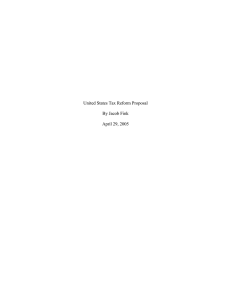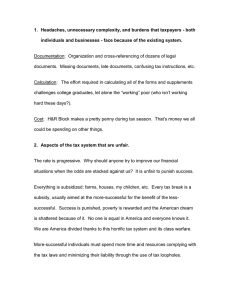Closing Loopholes Won't Be Simple Eric Toder February 3, 2011
advertisement
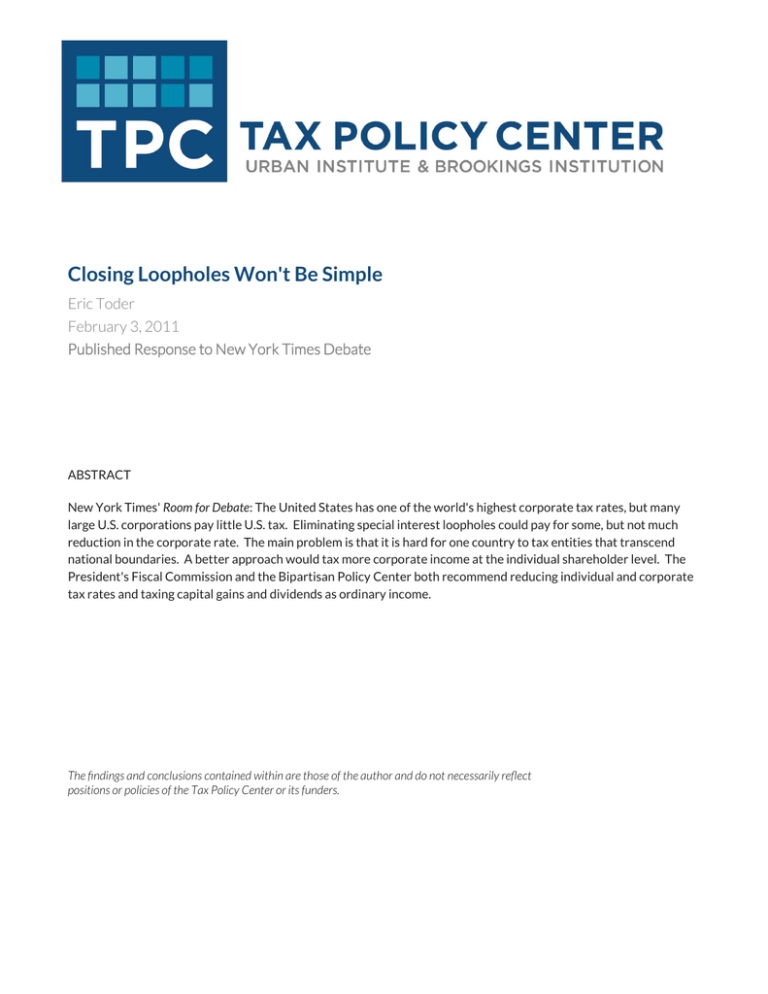
Closing Loopholes Won't Be Simple Eric Toder February 3, 2011 Published Response to New York Times Debate ABSTRACT New York Times' Room for Debate: The United States has one of the world's highest corporate tax rates, but many large U.S. corporations pay little U.S. tax. Eliminating special interest loopholes could pay for some, but not much reduction in the corporate rate. The main problem is that it is hard for one country to tax entities that transcend national boundaries. A better approach would tax more corporate income at the individual shareholder level. The President's Fiscal Commission and the Bipartisan Policy Center both recommend reducing individual and corporate tax rates and taxing capital gains and dividends as ordinary income. The findings and conclusions contained within are those of the author and do not necessarily reflect positions or policies of the Tax Policy Center or its funders. RESPONSE TO NEW YORK TIMES DEBATE: THE TROUBLE WITH CORPORATE TAXES CLOSING LOOPHOLES WON'T BE SIMPLE When Japan lowers its corporate tax rate this year, the U.S. corporate tax rate of 35 percent (about 39 percent counting average state corporate taxes) will be the highest in the O.E.C.D. But some large U.S. corporations pay very little corporate income tax. Why not just lower the corporate rate and make up the revenues by closing corporate loopholes? It's not so simple. I’ve looked closely at the provisions benefiting business investment that the budget lists as tax expenditures. A very small share of the revenue loss comes from provisions that could be characterized as "special interest" loopholes, such as the tax breaks for oil and gas or for alcohol fuels. I calculate that, when you restrict yourself to the true legislated loopholes, you could probably reduce the corporate rate by only about 3 or 4 percentage points — perhaps to 31 percent. So how come corporations can avoid so much tax and what can be done about it? The largest problem is the sheer difficulty any single country faces in taxing corporations that transcend national boundaries. If countries tax corporate income based on the residence of corporations, new corporations will form elsewhere and U.S.-based companies will lose business to existing foreign-based companies. If countries continue to tax corporate income based on where the profits originate, corporations will continue to find ways to shift reported income to low-tax jurisdictions. Congress and the I.R.S. can and should continue to try to outlaw specific abusive transactions, but it is a neverending and losing game as well-paid private sector advisers find new ways to shift income within the letter of the law. What we can instead do is repeal special tax breaks for corporate shareholders. At 15 percent, U.S. tax rates on dividends and capital gains are much lower than at any time in the postwar period. These rates are justified as relief for the "double taxation" of corporate profits, but with lower corporate tax burdens, this argument applies less. And because these taxes are based on worldwide income of U.S. individual shareholders, they can't easily escape them by investing in foreign assets. In addition to eliminating loopholes, both the President's Fiscal Commission and the debt reduction task force of the Bipartisan Policy Center have proposed reducing individual and corporate marginal rates and taxing all income — including dividends and capital gains — at the same rate. That is a better way to reform the taxation of corporate profits. Eric Toder is an Institute Fellow at the Urban Institute and co-director of the Urban-Brookings Tax Policy Center. His previous positions include Deputy Assistant Secretary for Tax Analysis at the Treasury Department and Director of the IRS Office of Research . TAX POLICY CENTER | URBAN INSTITUTE & BROOKINGS INSTITUTION 1 TAX POLICY CENTER | URBAN INSTITUTE & BROOKINGS INSTITUTION 2
